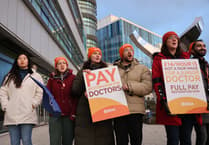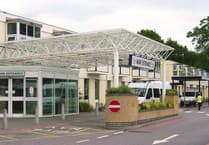Two weeks ago saw the first anniversary of the launch of the biggest vaccination programme in the history of the NHS, and last week we see the start of the Omicron Emergency Boost - a push to offer every eligible adult their booster jab by the new year.
What has been achieved in those 12 months is extraordinary, and we owe a huge debt of gratitude to the thousands of NHS staff and volunteers who continue to deliver the programme.
Local teams across Hampshire and the Isle of Wight are gearing up to deliver around 100,000 jabs per week, and they continue to test a number of ways to increase capacity, including the use of a mobile bus for walk-in boosters in areas with lower uptake.
The urgency with which the programme is being ramped up over the coming days is testament to the threat we now face from Omicron.
The highly-transmissible nature of this variant means it is fast becoming the dominant strain here in the UK, with the potential for hundreds of thousands of infections.
The risk to the NHS is it takes only a relatively small increase in the percentage of people who develop a serious illness and need care in hospital to create a massive wave of hospitalisations.
And this comes on top of winter pressures and hits a service already straining to tackle the backlog of non-Covid cases.
Scientists have worked at speed to try to determine just how serious the threat could be to our health services, and it is clear that immediate action was necessary to try to slow the spread.
Moving to Plan B is not about stopping - or even containing - Omicron. The steps announced last week are simply to try to slow transmission.
The action is aimed at enabling more people to be better protected against the variant, but also to reduce the total number of infections that could peak at the same time.
Plan B is also not lockdown. The only legal restrictions are mandatory face masks in most indoor public places and requiring proof of a negative test or double vaccination to enter some venues.
This means anyone who is not vaccinated, or only partly vaccinated, can still access the events and places they want to by showing a negative lateral flow test result. Boosters are not required and under-18s are exempt.
These regulations will automatically expire after six weeks, and could end before if a review early in the new year shows them to be no longer necessary. We have not had to resort to some of the measures seen in other European countries, and that is down to the success of the UK’s vaccination programme to date.
It is really important we recognise just how fast events are moving, and that we need more time to understand the true nature of Omicron - how severe it will be and how effective it will be at evading vaccines.
These are significant but critical gaps in knowledge which means decisions need to be based on the best possible informed judgements.
The clarity we would like to have is simply not available - there is some grey where we would like to see clear black and white.
But we are certain in the role vaccines have in protecting people, and this remains our exit strategy to the pandemic. Work is already under way to reformulate vaccines and the development of ’multi-valent’ vaccines will also be able to take on multiple variants.
We’re also making good progress in the use of therapeutic drugs to treat Covid, and as the virus moves towards an endemic stage, so we get closer to the possibility of annual vaccination regimes.
The arrival of Omicron is unwelcome but not unexpected. The high number of mutations and rapid transmissibility may be unusual, but new variants are a constant and normal path of viruses - we just need more time for more data to inform more scientific development.
In the meantime, we need to act - to slow the spread and to buy ourselves that all-important time.
Timely action is incredibly important. Inevitably you only see the full scale of something when it has happened.
But the growth rate (the ’R’) of an infectious disease predicts it.
Waiting to see the effects of inaction would have taken us right into Christmas. People rightly expect government to act early.
No-one in government wants to see measures that restrict the freedoms of individuals, but we have a duty to protect citizens and the services they rely on.
Going forward, four key metrics will be monitored - the efficacy of vaccines and boosters, the severity of disease, the extent of transmissibility, and the rate of hospitalisation. This will help us to track the path of Omicron and to understand how best to deal with this particular phase of the pandemic.
There is, of course, uncertainty ahead, which is particularly difficult as we approach Christmas and consider our plans for getting together with friends and family, and we all hope the steps we take now will be enough to avoid more measures being necessary.




